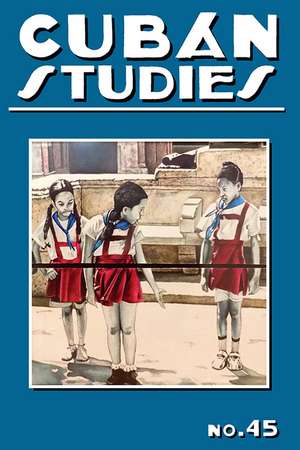Cuban Studies 45: Pittsburgh Cuban Studies
Editat de Alejandro de la Fuenteen Limba Engleză Hardback – 23 ian 2017
Cuban Studies is the preeminent journal for scholarly work on Cuba. Each volume includes articles in English and Spanish and a large book review section.
Cuban Studies 45 features two special dossiers: the first discusses the history and workings of the Cuban constitution and the need to revisit it along with civil and political rights; the second offers new perspectives on the history of health, medicine, and disease in Cuba, and views race as a factor in both infant mortality and tuberculosis from the early-to-mid twentieth century.
Additional essays discuss culture through poetry, higher education reform, the narratives of Lordes Casal, and filmmaker Jesús Díaz as an ‘unintentional deviationist.’ History is discussed vis-a-vis the radio politics of young Eddy Chibás, the slave abolitionist rhetoric of the Countess of Merlin, and the creole appropriation of Afro-Cuban dance and music to create sabor during the late nineteenth century.
Cuban Studies 45 features two special dossiers: the first discusses the history and workings of the Cuban constitution and the need to revisit it along with civil and political rights; the second offers new perspectives on the history of health, medicine, and disease in Cuba, and views race as a factor in both infant mortality and tuberculosis from the early-to-mid twentieth century.
Additional essays discuss culture through poetry, higher education reform, the narratives of Lordes Casal, and filmmaker Jesús Díaz as an ‘unintentional deviationist.’ History is discussed vis-a-vis the radio politics of young Eddy Chibás, the slave abolitionist rhetoric of the Countess of Merlin, and the creole appropriation of Afro-Cuban dance and music to create sabor during the late nineteenth century.
Preț: 482.04 lei
Preț vechi: 567.12 lei
-15% Nou
Puncte Express: 723
Preț estimativ în valută:
92.24€ • 96.55$ • 76.77£
92.24€ • 96.55$ • 76.77£
Carte disponibilă
Livrare economică 10-24 martie
Preluare comenzi: 021 569.72.76
Specificații
ISBN-13: 9780822944638
ISBN-10: 0822944634
Pagini: 448
Ilustrații: 11 b&w
Dimensiuni: 152 x 229 x 33 mm
Greutate: 0.72 kg
Ediția:1
Editura: University of Pittsburgh Press
Colecția University of Pittsburgh Press
Seria Pittsburgh Cuban Studies
ISBN-10: 0822944634
Pagini: 448
Ilustrații: 11 b&w
Dimensiuni: 152 x 229 x 33 mm
Greutate: 0.72 kg
Ediția:1
Editura: University of Pittsburgh Press
Colecția University of Pittsburgh Press
Seria Pittsburgh Cuban Studies
Recenzii
Praise for Cuban Studies
“A new editorial team led by Alejandro de la Fuente draws on scholarship from Cuba and around the world to make this multidisciplinary journal a must-read for those looking beyond the headlines for a deeper understanding of the rapid changes taking place on the island.”
—Foreign Affairs
“A new editorial team led by Alejandro de la Fuente draws on scholarship from Cuba and around the world to make this multidisciplinary journal a must-read for those looking beyond the headlines for a deeper understanding of the rapid changes taking place on the island.”
—Foreign Affairs
Notă biografică
Alejandro de la Fuente is the Robert Woods Bliss Professor of Latin American History and Economics and professor of African and African American studies at Harvard University and director of the Afro-Latin American Research Institute in the Hutchins Center for African and African American Research. He is the author of Havana and the Atlantic in the Sixteenth Century and A Nation for All: Race, Inequality, and Politics in Twentieth-Century Cuba, and is the editor of Queloides: Race and Racism in Cuban Contemporary Art.
Descriere
Cuban Studies 45 features two special dossiers: the first discusses the history and workings of the the Cuban constitution and the need to revisit it along with civil and political rights; the second offers new perspectives on the history of health, medicine, and disease in Cuba, and views race as a factor in both infant mortality and tuberculosis from the early-to-mid twentieth century. Additional essays discuss culture through poetry, higher education reform, the narratives of Lordes Casal, and filmmaker Jesús Díaz as an ‘unintentional deviationist.’ History is discussed vis-a-vis the radio politics of young Eddy Chibás, the slave abolitionist rhetoric of the Countess of Merlin, and the creole appropriation of Afro-Cuban dance and music to create sabor during the late nineteenth century.






